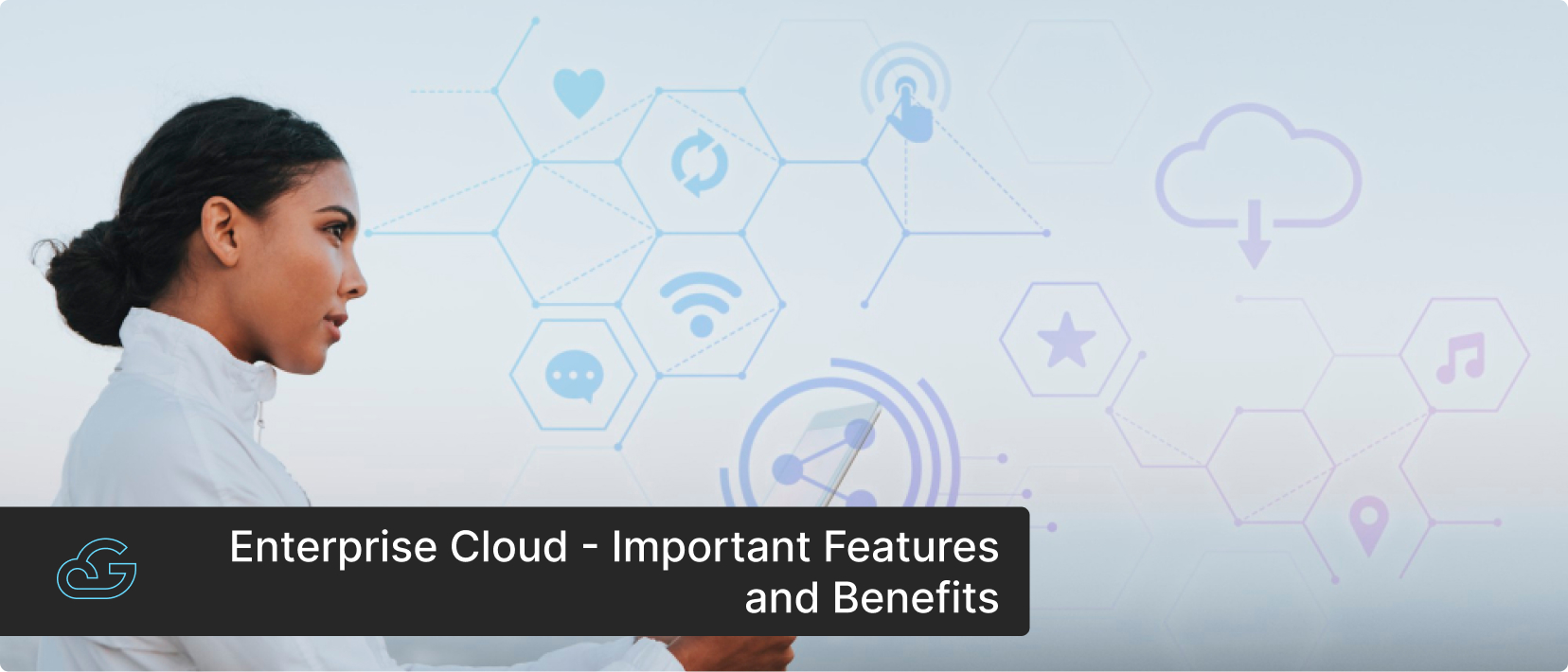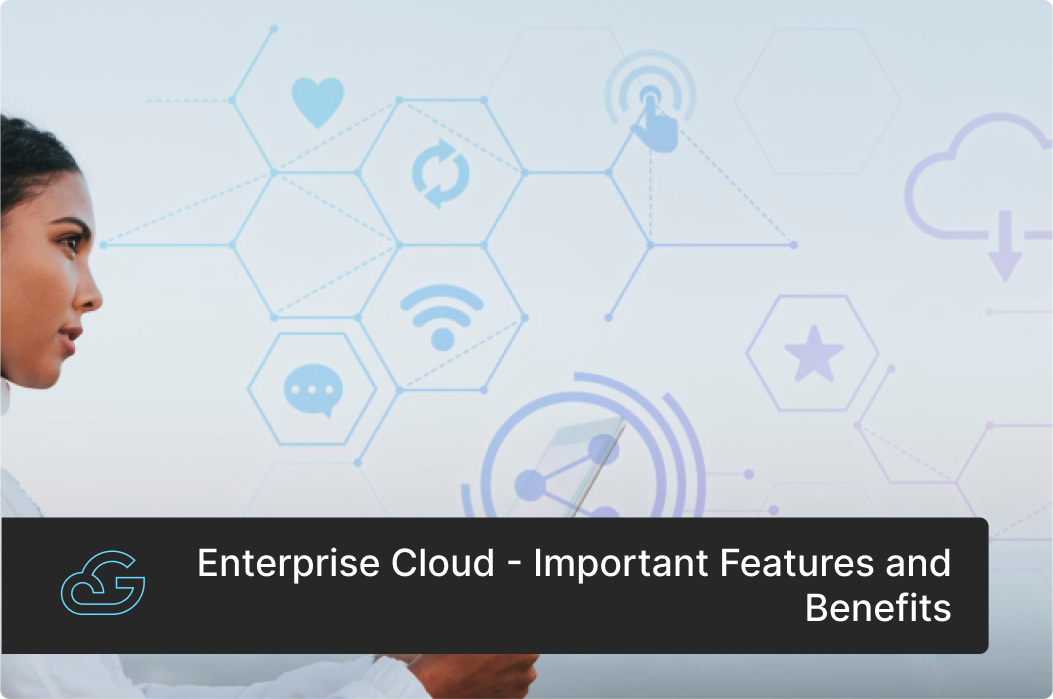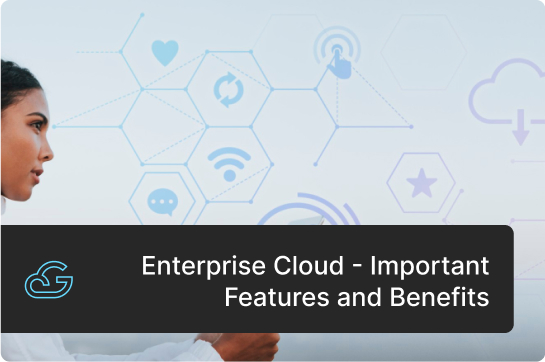Blogs / Cloud Consulting
What is Enterprise Cloud? Important Benefits & Features to Consider
By
Sherin Job Varghese
Posted: October 21st, 2024
• 7 minutes
When it comes to cloud computing, traditionally there are two deployment models—public clouds and private clouds. Both of these deployment models provide varying levels of control, security, and customization. However, for large enterprises with complex IT requirements, simply relying on public clouds or private clouds will not suffice. Instead, you will need a tailored cloud model that combines the strengths of public and private clouds. This is where the enterprise cloud comes into play.
What is Enterprise Cloud Computing?
Enterprise cloud is a unique cloud computing model designed specifically to cater to the demands of large enterprises. It combines the strengths of different cloud computing models while creating a totally unified IT environment that offers centralized control and management.
Fundamentally, the enterprise cloud is characterized by its highly flexible and scalable architecture that can accommodate the massive computing needs of large organizations. But there is more to it. Enterprise cloud features cutting-edge security and compliance mechanisms, such as robust data encryption, granular access controls, and auditing capabilities, to help you meet stringent regulatory mandates across various industries.
On top of that, it comes with built-in support for hybrid and multi-cloud environments. That is, in a traditional cloud computing setup involving a public or private cloud, you will need to revamp the cloud architecture to convert it to a hybrid or multi-cloud model.
But an enterprise cloud is inherently a combination of both public and private clouds, making it hybrid or multi by default. It can even extend to distributed clouds and edge computing environments. This way, you can maintain control over your data and workloads while leveraging the scalability and cost-effectiveness of public cloud platforms.
Furthermore, enterprise cloud solutions often come with built-in features that include self-service portals, automation capabilities, and orchestration tools. This will empower your IT team to provision and manage resources effectively and optimize workload efficiency, thereby eliminating silos and complexities.
Why Use Enterprise Cloud
To understand the full capabilities of enterprise cloud, let’s consider a scenario where a large multinational corporation is trying to set up a Customer Relationship Management (CRM) system. If the company is relying on a traditional cloud computing model for deploying a CRM, it will face several limitations.
Traditional cloud offerings may lack the scalability, security controls, and integration capabilities required to support a global CRM deployment accessible to the entire workforce, partners, and customers. Additionally, ensuring compliance with data privacy regulations across multiple regions and seamlessly integrating the CRM with the company’s existing on-premises systems could prove challenging.
In contrast, by leveraging an enterprise cloud platform, the company can develop and deploy a highly scalable and secure CRM system that its global workforce, partners, and customers can access seamlessly. The enterprise cloud CRM can be designed with robust security features, such as advanced encryption, granular access controls, and auditing capabilities, to ensure the protection of sensitive customer data and compliance with regional data privacy regulations.
Furthermore, the enterprise cloud solution enables seamless integration with the company's on-premises systems, such as Enterprise Resource Planning (ERP) tools, business intelligence tools, edge devices, and more, delivering a unified view of customer data and interactions across the organization.
Differences Between Enterprise Cloud & Traditional Cloud Computing
In principle, both enterprise cloud and traditional cloud computing (private clouds and public clouds) offer virtualized IT resources over the Internet. However, there are some fundamental differences between these cloud models in their scale, performance, control, and more.
Let’s look at these aspects in detail.
7 Key Characteristics of Enterprise Cloud
Traditional cloud deployment (public or private) is a more practical and simple solution for less complex workloads. But as this complexity starts increasing you will have to commission and decommission resources almost instantaneously while updating your cloud architecture constantly. This is extremely difficult and without the right IT expertise, it is nearly impossible. Instead, by adopting an enterprise cloud strategy from the onset, you can steer clear of all the roadblocks that traditional cloud computing models pose while acquiring a one-of-a-kind cloud experience.
Here are 7 key characteristics of enterprise cloud that make it appealing for large organizations:
-
Centralized Control & Management:
By implementing an enterprise cloud strategy, you will obtain a centralized hub for managing your IT stack. This could include everything from on-prem systems and hybrid cloud environments to edge computing devices and distributed clouds. With this, your IT team can acquire a unified view and control the entire infrastructure, making it easy to ensure consistent governance and policy enforcement.
-
Effective Hybrid & Multi-Cloud Integration:
Crafting a cloud architecture that combines multiple cloud platforms, private and public clouds, and on-prem data centers can be extremely difficult. Enterprise clouds on the other hand can seamlessly integrate with on-prem data centers, private clouds, public clouds, edge cloud environments, and much more. This high level of flexibility allows you to attain the best of each cloud computing model.
-
Scalability & High Availability:
Enterprise cloud platforms have the inbuilt ability to allocate and deallocate resources quickly on demand. As a result, they can easily handle high-performance workloads and demand spikes and scale up and down as required. Additionally, they also come with high availability and disaster recovery capabilities, ensuring mission-critical applications and services remain operational 24/7.
-
Advanced Security & Compliance:
If you are operating in a highly regulated industry (finance, healthcare & pharma, government, etc.), it is absolutely mandatory that you prioritize security and compliance. Enterprise cloud platforms are designed with advanced security mechanisms like encryption, granular access controls, and auditing capabilities to maintain compliance with industry-specific regulations and data protection standards.
-
Automation & Orchestration:
Automation and orchestration are key elements of cloud computing. Enterprise cloud platforms are often equipped with automation and orchestration tools or platforms to streamline IT operations and reduce manual efforts. With these tools, you can automate resource provisioning, configuration management, and deployment of applications or infrastructure. This increases overall efficiency while reducing the risk of human error.
-
Self-Service Portals & APIs:
Everything is at your fingertips with enterprise cloud platforms. They come with self-service portals and APIs that allow you to provision and manage cloud resources easily with minimal reliance on IT personnel. With this, you can enhance your agility while accelerating the time-to-market for new applications and services.
-
Workload Optimization & Cost Management:
Optimizing resources for various workloads and managing the costs are often cited as the major challenges associated with cloud computing. Enterprise cloud platforms feature inbuilt workload optimization and cost management capabilities. With these capabilities, you can rightsize resources based on demand and implement cost governance policies to streamline your cloud spending.
What are the Benefits of Selecting an Enterprise Cloud Computing Strategy?
Adopting an enterprise cloud strategy offers numerous advantages for large organizations with complex IT requirements. Here are some key benefits of embracing enterprise cloud computing:
-
Enhanced Governance & Control:
By opting for an enterprise cloud strategy, you are acquiring a centralized management plane that unifies all the components of your IT infrastructure. With it, you can enforce governance and security policies uniformly while maintaining regulatory compliance throughout your systems.
-
Seamless Integration & Interoperability:
Your IT environment might include various diverse elements like on-prem data centers, multiple cloud providers, and even edge computing infrastructures. Enterprise cloud platforms are designed to integrate and interoperate with these elements seamlessly. This enables you to get the best out of each cloud provider and maintain a consistent user experience.
-
Access to Sophisticated Tools and Frameworks:
An enterprise cloud strategy provides access to sophisticated tools and frameworks that enable efficient innovation across the IT landscape. As a large enterprise, you will often require advanced capabilities to rapidly develop, test, and deploy new applications, technologies, and services. With enterprise cloud solutions, you can accelerate software development cycles, experiment with emerging technologies, and rapidly bring innovative ideas to production.
-
Enhanced Collaboration & Productivity:
Self-service portals, APIs, and collaboration tools are some of the distinct characteristics of enterprise cloud platforms. These characteristics enable all stakeholders, like developers, partners, and clients, to collaborate and manage resources effectively, which will foster innovation and business agility.
Who Benefits from Enterprise Cloud Solutions?
While the specific benefits may vary, the scalability, security, and flexibility offered by enterprise cloud computing make it a valuable asset for businesses in highly regulated or data-intensive industries.
Let’s first evaluate how different industries can leverage enterprise cloud computing effectively:
-
Enterprise Cloud for Healthcare & Lifesciences:
- Storing and managing sensitive patient data securely
- Ensuring compliance with regulations like HIPAA & GDPR
- Allocating computing resources for complex workloads (medical imaging, drug discovery simulations, etc.)
- Establishing robust disaster recovery and data backup mechanisms
-
Enterprise Cloud for Banking, Financial Services & Insurance:
- Adhering to stringent regulations like PCI-DSS and GLBA
- Powering real-time fraud detection engines
- Conducting risk analysis and financial modeling
- Handling massive transaction volumes
-
Enterprise Cloud for Retail and E-commerce:
- Handling peak demand and traffic surges
- Acquiring advanced analytics and machine learning capabilities
- Offering personalized recommendations
- Conducting customer behavior analysis and supply chain optimization
- Enhancing customer experience
-
Enterprise Cloud for Manufacturing and Industrial:
- Managing industrial IoT (IIoT) data and applications
- Low-latency data processing and real-time decision-making
- Advanced analytics and simulations
-
Enterprise Cloud for Media and Entertainment:
- Scalable storage and content delivery networks
- Handling large media files
- Ensuring uninterrupted video streaming
- High-performance rendering and transcoding capabilities
- Smart analytics for content recommendation and audience insights
Any industry that handles complex workloads can benefit from enterprise cloud solutions. We have only listed a few of the most prominent industries. There are other industries like Telecommunications, the Public sector (government bodies), and much more, where enterprise cloud can prove to be a difference maker.
Looking for Reliable Enterprise Cloud Solutions?
It is clear that enterprise cloud solutions can open up a world of possibilities for you. However, integrating it into your organization requires a certain skill set and knowledge of different industries. We possess this skill set, and our team of cloud experts comes with relevant industry acumen, helping you overcome all the challenges associated with enterprise cloud.
Our cloud experts have vast experience in designing, implementing, and managing enterprise-grade cloud solutions that are tailored to your specific business needs. With Gsoft Cloud as your partner, you can benefit from:
- Industry-specific knowledge
- Advanced security and compliance
- Seamless cloud integration and interoperability
- Comprehensive support and managed services
Summary:
The enterprise cloud market is projected to exceed USD 1 trillion by 2027. This reflects the growing demand for robust and scalable cloud solutions among large organizations. As businesses continue to embrace digital transformation and navigate the complexities of modern IT environments, adopting enterprise cloud solutions has become a strategic imperative.
Are you looking for enterprise cloud solutions to drive innovation, optimize costs, and gain a competitive edge? Reach out to us at www.gsoftcomm.net/contact-us/.


Get Know More About Our Services and Products
Reach to us if you have any queries on any of our products or Services.










